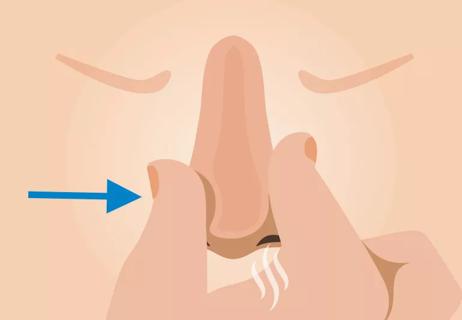Breathing through your nose is far better for you, but depending on your anatomy, that may not always be possible

You’ve probably been told in certain situations to “Breathe in through your nose and out through your mouth,” especially during exercise or meditation or to relax. But have you ever wondered why?
Advertisement
Cleveland Clinic is a non-profit academic medical center. Advertising on our site helps support our mission. We do not endorse non-Cleveland Clinic products or services. Policy
Part of the reason is simple: Breathing through your nose is the most beneficial way to breathe. Pulmonary medicine specialist Jason Turowski, MD, says that it has to do with evolution — and all the little things that happen as we take that breath, from filtering and humidifying the air to releasing nitric oxide.
Humans are naturally designed to breathe through our noses from birth. It’s the way we’ve evolved. “When we’re newborns, we breathe in and out through our noses almost all the time,” Dr. Turowski explains. “This is related to how our throats are configured, so we can breathe and suckle at the same time without choking. It’s a survival mechanism.”
There are good reasons why we continue to default to nasal breathing as we get older, too. To start, inhaling through your nose offers many more benefits to your body than taking in air through your mouth.
Our noses are designed to process the air that comes in very differently than our mouths. These are intentional and functional parts of our body’s design to keep us safe and healthy. So, why do we ever breathe with our mouths?
Some people use the term “mouth breather” as an insult, a way of suggesting a person lacks intelligence. It’s a mean thing to say. It’s also wrong. Most people use both their noses and mouths to breathe. And which type of breathing we favor has nothing to do with intelligence.
Advertisement
If you’re more inclined to breathe through your mouth, you may have:
If you don’t have any of these conditions, but inhale through your mouth more often than not, you may want to mention it the next time you’re at your doctor or dentist’s office. (It’s not an emergency unless you’re struggling to breathe.) You may have an underlying condition that, if treated, could make breathing through your nose more comfortable.
Here are all the good things your nose does that your mouth doesn’t when you breathe in:
Advertisement
There are clearly plenty of benefits to breathing in through your nose. But that’s not all. Dr. Turowski says there are also clear downsides to breathing in through your mouth.
Saliva plays a crucial role in our oral health. It keeps our mouths lubricated, protects our enamel, and drowns out harmful materials like sugar and acid. Breathing through your mouth robs your saliva, so all those nasties sit on your teeth longer. That can lead to chronic bad breath (halitosis), gingivitis, cavities and other periodontal problems.
Breathing through your mouth can also cause (or contribute to):
Dr. Turowski says that if you aren’t living with a health condition that prevents it, there are only two times that you really need to engage in mouth breathing:
You’ll still lose out on those benefits that breathing through your nose provides, but — on those specific occasions — it’s a worthwhile trade.
If you usually breathe through your mouth and want to change that, Dr. Turowski recommends seeing a healthcare provider. Mouth breathing isn’t our natural default, so there’s frequently a reason you’re doing it. Before you try to make any big changes, it’s best to find out what that reason is. In some cases, mouth breathing simply can’t (and shouldn’t) be avoided.
Advertisement
Let’s say you find out that your mouth breathing is simply a bad habit or a side effect of a condition like anxiety. In those cases, breathwork may help you both break the habit and feel more relaxed. Here are a few techniques to get you started:
Building awareness of your breath can only help you. But other strategies for stopping mouth breathing can be downright dangerous. In particular, Dr. Turowski warns against mouth taping.
If you’re not sure whether your nose breathing strategy is safe, ask a provider’s advice.
When it comes to “fixing” mouth breathing, don’t ask if it’s too late. Ask if the symptoms it’s causing are having a negative impact on your quality of life — and what it would take to correct the problem.
Your answer will depend on what’s causing the issue. If all it’s going to take is adding an over-the-counter allergy treatment to your daily medications, that’s a change worth making. If you’re inhaling through your mouth because your congestive heart failure or chronic obstructive pulmonary disease (COPD) leaves you feeling breathless, your and your provider’s priority will probably be managing the dyspnea, not the mouth breathing.
Advertisement
Mouth breathing isn’t ideal, but it isn’t the end of the world either. If you aren’t bothered by symptoms and don’t have any underlying medical conditions that require treatment, changing the behavior is a personal choice.
That said, working with a provider to home in on the cause of your mouth breathing may uncover a health condition you didn’t know you had. And addressing that condition may mean better sleep, drama-free dental appointments, a healthier, happier mindset or fewer days spent coughing and sputtering with allergies. And incorporating breathing exercises into your daily routine is a great way to practice mindfulness and reduce stress.
So, have a conversation with a provider about your breathing. That way, whatever you choose to do, you’ll be making an informed choice.
Learn more about our editorial process.
Advertisement

Changing how you breathe, gargling water and distracting yourself are all common ways to stop your diaphragm from spasming

Simple at-home solutions, like doing pursed lip breathing and drinking a warm beverage, can often bring immediate relief

Mouth taping may seem promising, but it can actually cause more harm than good, especially if you snore or have sleep apnea

When something like food or drink goes down your windpipe rather than your esophagus, it can cause coughing and sometimes choking

Getting vaccinated in October can help protect you against severe illness between November and March

One theory is brain temperature regulation, and yes, a ‘contagious yawn’ is a real thing

Dry drowning is an airway closure from choking on water without getting fluid in your lungs

This style of breathwork can invigorate you and help you focus

Wearing a scarf, adjusting your outdoor activities and following your asthma treatment plan can help limit breathing problems

Your diet in the weeks, days and hours ahead of your race can power you to the finish line

When someone guilt trips you, they’re using emotionally manipulative behavior to try to get you to act a certain way